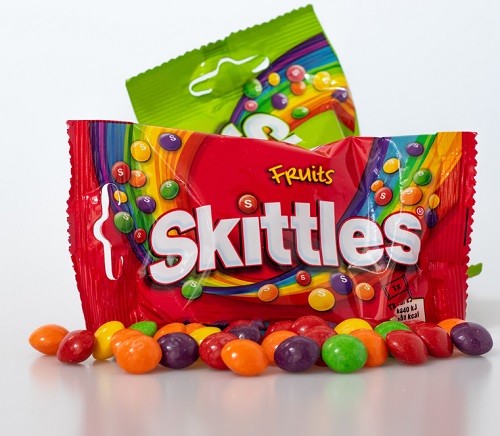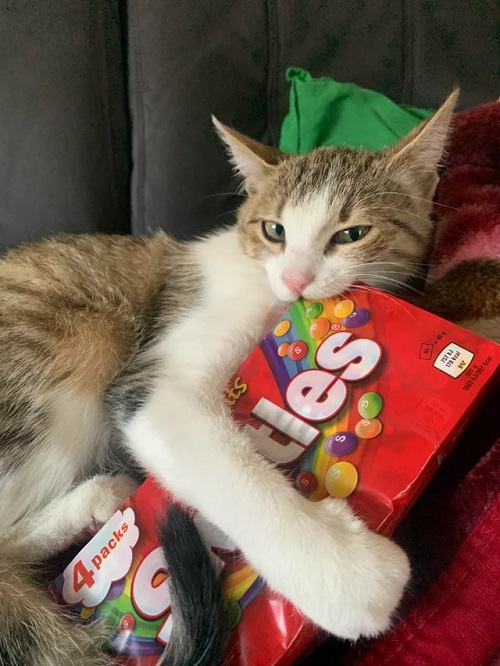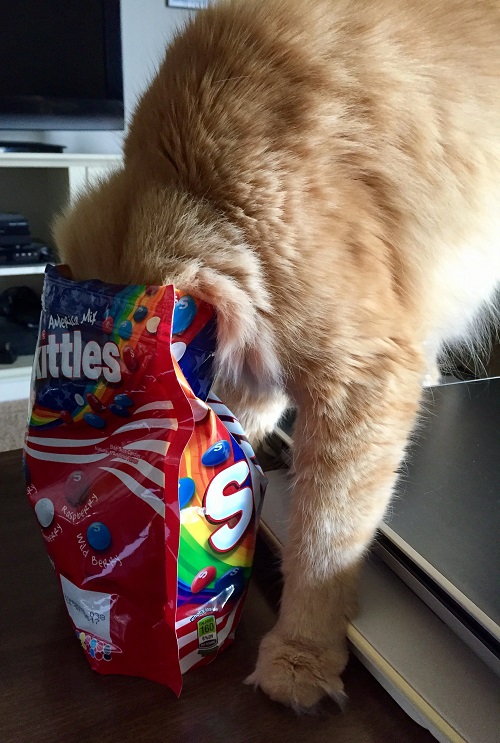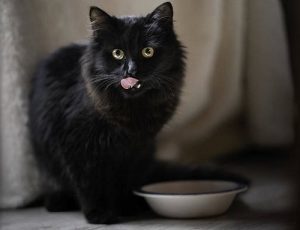Can Cats Eat Skittles? Find out the dos and don’ts of offering these sugary treats to your furry friend in this informative article.
If you’re a cat parent who loves tangy Skittles, you might be wondering whether this candy is safe for your feline friend. So get ready to discover Can Cats Eat Skittles or Not below.
Can Cats Eat Gummy Bears? Find out here
What Are Skittles?

Skittles are bite-sized candies that are popular for their vibrant colors and fruity flavors. They are small, round, and have a hard shell coating with a chewy center. Skittles come in a variety of flavors, including strawberry, orange, lemon, green apple, and grape. These colorful treats are often enjoyed as a snack or used for various purposes, such as decorating cakes or desserts.
Can Cats Eat Skittles?
While Skittles are tempting for humans, it’s not an ideal treat for cats. Felines have specific dietary needs and digestive systems that differ from humans, making certain human foods unsuitable for them, including Skittles. All candies are primarily composed of sugar and artificial ingredients, which are not part of a cat’s natural diet. Feeding Skittles to kitties can cause various health issues and complications due to their high sugar content. That’s why it’s best to stick to cat-friendly treats and foods specifically formulated for feline nutrition to ensure your cat’s well-being and health.
Are Skittles Poisonous To Cats?

Skittles are not considered toxic or poisonous to cats. However, they are not suitable for feline consumption and can pose potential health risks like digestive upset, weight gain, dental problems, and other issues. However, if your cat has eaten one or two Skittles, it should not be a cause for worry.
Do Skittles Contain Any Nutritional Value For Cats?
Skittles do not provide any significant nutritional value to felines. They are primarily composed of sugar, artificial colorings, and flavors, which do not offer any essential nutrients that felines require for their overall health. Feeding Skittles to felines would be providing them with empty calories and potentially harmful ingredients.
Risks of Feeding Skittles To Cats

- Digestive Upset: Skittles contain high levels of sugar and artificial ingredients that can disrupt a cat’s digestive system, leading to an upset stomach.
- Nutritional Imbalance: Skittles lack essential nutrients required for a cat’s optimal health. Feeding them as a treat can contribute to a nutritional imbalance and deficiencies in their diet.
- Obesity: The high sugar content in Skittles can contribute to weight gain in cats. Obesity in cats can lead to various health problems, like joint issues, and affects the quality of life.
- Dental Issues: The sticky and sugary nature of Skittles can adhere to a cat’s teeth, promoting the growth of plaque and tartar. This can lead to dental decay, gum disease, and tooth loss if not addressed.
- Allergic Reactions: Cats can have allergies or sensitivities to certain ingredients found in Skittles, such as artificial colors or flavors. These allergic reactions can manifest as skin irritations, itching, or gastrointestinal distress.
Tips On Keeping Cats and Skittles Apart
- Store securely: Ensure that Skittles and other tempting candies are kept in airtight containers or sealed bags. Place them in cabinets or pantry shelves that are out of your cat’s reach.
- Be mindful of sharing spaces: Avoid leaving Skittles or any other food items unattended on countertops, tables, or other accessible areas where your pet can easily reach them.
- Discard wrappers properly: After enjoying Skittles or any other candy, dispose of the wrappers immediately and securely. Felines may be attracted to the crinkling sound or the lingering scent of the wrappers, so keep them out of their reach.
- Provide engaging alternatives: Keep your cat entertained with interactive toys, puzzle feeders, or treats designed specifically for feline enrichment. Engaging your cat in play and mental stimulation can divert their attention from seeking out Skittles or other forbidden foods.
Remember, prevention is key when it comes to keeping cats and Skittles apart. By implementing these tips, you can create a safe environment and minimize the risk of your curious feline indulging in forbidden treats.
My Cat Ate Skittles. What To Do?
- Assess the quantity consumed: Determine how many Skittles your cat has eaten. If it was only a small amount, it may not cause any immediate harm but still monitor your furball’s behavior and health.
- Provide fresh water: Ensure your kitty has access to fresh water to stay hydrated. This can help dilute any potential adverse effects of consuming Skittles.
- Watch for signs of digestive upset: Keep an eye on your cat for any signs of digestive issues, such as decreased appetite.
- Contact a vet: If your cat has ingested a large quantity of Skittles or is showing concerning symptoms, contact a vet immediately for further help.
Can Cats Eat Skittles? Quick Takeaways!
- Skittles are bite-sized candies with a hard shell coating and a chewy center, available in various fruity flavors.
- Cats should not eat Skittles due to their specific dietary needs and digestive systems.
- Skittles do not provide any nutritional value for cats and are composed mainly of sugar and artificial ingredients.
- Feeding Skittles to cats can lead to digestive upset, nutritional imbalances, obesity, dental issues, and potential allergic reactions.
- It is important to prioritize a balanced diet of cat-specific nutrition and avoid feeding cats Skittles or other human treats.
- Try to maintain a safe distance between cats and Skittles by storing them securely, being mindful of sharing spaces, discarding wrappers properly, and providing engaging alternatives.
- If your pet accidentally consumed Skittles, assess the quantity ingested, provide fresh water, watch for signs of digestive upset, and contact a vet.



